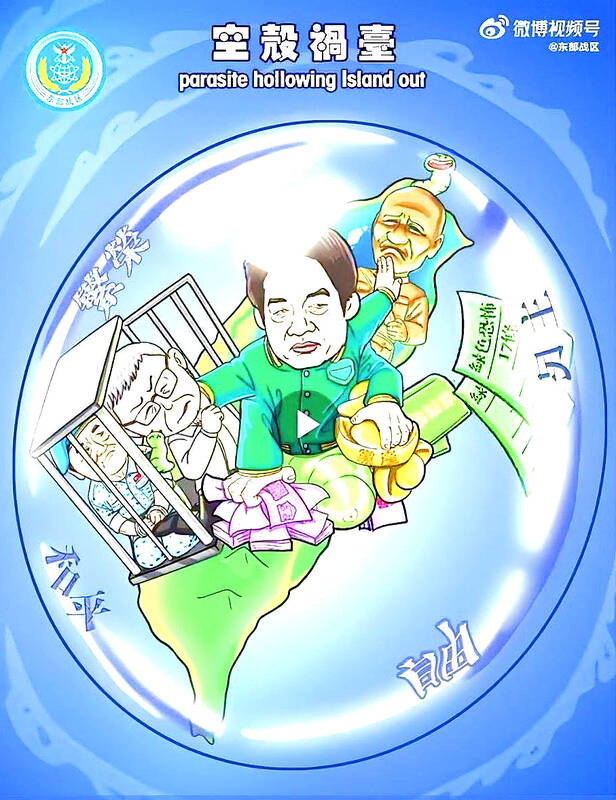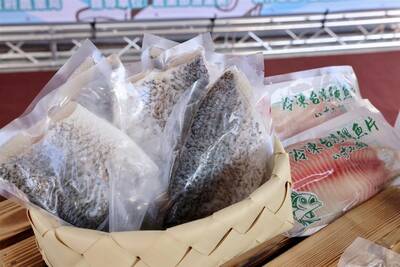The Chinese People’s Liberation Army’s (PLA) large-scale joint exercises around Taiwan on Tuesday were accompanied by propaganda comparing itself to a mighty monkey warrior in Chinese mythology and President William Lai (賴清德) to a parasite, but experts said those messages were primarily meant for domestic audiences and were lost on Taiwanese.
In one video uploaded by the PLA on Weibo when it announced the start of the exercises, it compared its air and naval forces to the Monkey King from the classic Chinese novel Journey to the West (西遊記). The video also included footage from the video game Black Myth: Wukong, juxtaposed with videos of PLA forces targeting Taipei 101 and what appeared to be the Wan Chun Fleet — CM-32 armored vehicles designated to protect the president during major crises or emergencies — cruising through Taipei’s Hankou Street.
Another posted video showed a cartoon of Lai as a parasite, held by its captor against a backdrop of a burning Taiwan ravaged by PLA forces.

Photo from Weibo
The videos were likely meant to “appease” the Chinese after recent events, including the deportation of Chinese national Liu Zhenya (劉振亞), also known as “Yaya in Taiwan” (亞亞在台灣), who often advocated for a “military takeover” of Taiwan by China, Tamkang University Graduate Institute of International Affairs and Strategic Studies assistant professor Lin Ying-yu (林穎佑) said.
China also wants to placate public discontent about sweeping policies Lai laid out to resist China’s attempts to destroy Taiwan’s sovereignty, and divide public opinion on the matter, Liu said.
Lai last month announced 17 measures to counter infiltration, including strengthening defense capabilities and economic security, and creating “action plans” to collaborate with Taiwan’s friends and diplomatic allies in demonstrating firm rejection of China’s attempts to take the nation.
National Defense and Security Research research fellow Su Tzu-yun (蘇紫雲) said the videos were primarily internal propaganda to galvanize the “little pinks,” a nickname for ethnocentric, pro-unification Chinese youths, amid reports of arrests of high-ranking PLA officials.
Those arrested include Central Military Commission Vice Chairman He Weidong (何衛東) and PLA Eastern Theater Command Commander Lin Xiangyang (林向陽), both of whom are perceived as loyalists of Chinese President Xi Jinping (習近平).
China’s uncertain economic outlook amid a heated trade war with the US, as evidenced by a meeting between Xi and more than 40 executives from international corporations on March 28 in a bid to attract foreign investment, could also explain the need to divert public attention, Su said.
Lin said the videos had a secondary objective: to wage psychological warfare against Taiwanese and, with the help of “local collaborators,” influence public opinion in Taiwan.
However, that would likely have a limited effect, as “you are unlikely to change how you perceive yourself just because of those videos,” Lin said.
Su said that if the propaganda was also targeting the Taiwanese public, it had failed, as Taiwan’s stock exchange proved unperturbed by the drills.
“This showed that even the investors, who are usually most sensitive to potentially adverse outside factors, did not seem to care much about the drills,” Su added.
Regarding whether Taiwanese media should report on Chinese propaganda, given that not many people in Taiwan follow Chinese state-run mouthpieces, Australian National University sessional lecturer Sung Wen-ti (宋文笛) said that it should, to bolster the public’s resiliency against propaganda.
“Democracies thrive on the free flow of information to create a more informed and resilient citizenry, as resiliency comes from exposure therapy, not protective bubbles,” Sung said. “What democracies need is a counterbalance against propaganda with better information, so as to build information literacy and immunity.”
Lin also said that Taiwanese media should report on the PLA, but provide facts to counter any unfounded claims, to avoid perpetuating disinformation.

Taiwan's Vice President Hsiao Bi-khim (蕭美琴) said Saturday that she would not be intimidated by the Chinese Communist Party (CCP), following reports that Chinese agents planned to ram her car during a visit to the Czech Republic last year. "I had a great visit to Prague & thank the Czech authorities for their hospitality & ensuring my safety," Hsiao said on social media platform X. "The CCP's unlawful activities will NOT intimidate me from voicing Taiwan's interests in the international community," she wrote. Hsiao visited the Czech Republic on March 18 last year as vice president-elect and met with Czech Senate leadership, including

There have been clear signs of Chinese Communist Party (CCP) attempts to interfere in the nationwide recall vote on July 26 in support of Chinese Nationalist Party (KMT) legislators facing recall, an unnamed government official said, warning about possible further actions. The CCP is actively involved in Taiwanese politics, and interference in the recall vote is to be expected, with multiple Chinese state media and TAO attempts to discredit the Democratic Progressive Party (DPP) and undermine public support of their recall movement, the official said. This interference includes a smear campaign initiated this month by a pro-Beijing Hong Kong news outlet against

A week-long exhibition on modern Tibetan history and the Dalai Lama’s global advocacy opened yesterday in Taipei, featuring quotes and artworks highlighting human rights and China’s ongoing repression of Tibetans, Hong Kongers and Uighurs. The exhibition, the first organized by the Human Rights Network for Tibet and Taiwan (HRNTT), is titled “From the Snowy Ridges to the Ocean of Wisdom.” “It would be impossible for Tibetans inside Tibet to hold an exhibition like this — we can do it. because we live in a free and democratic country,” HRNTT secretary-general Tashi Tsering said. Tashi Tsering, a Taiwan-based Tibetan who has never

A first shipment of five tons of Taiwan tilapia was sent from Tainan to Singapore on Wednesday, following an order valued at NT$600,000 (US$20,500) placed with a company in the city. The products, including frozen whole fish and pre- cooked fish belly, were dispatched from Jiangjun Fishing Harbor, where a new aquatic processing and logistics center is under construction. At the launch, Tainan Mayor Huang Wei-che (黃偉哲) called the move a “breakthrough,” marking Taiwan’s expansion into the Singaporean tilapia market. Taiwan’s tilapia exports have traditionally focused on the United States, Canada, and the Middle East, Huang said, adding that the new foothold in